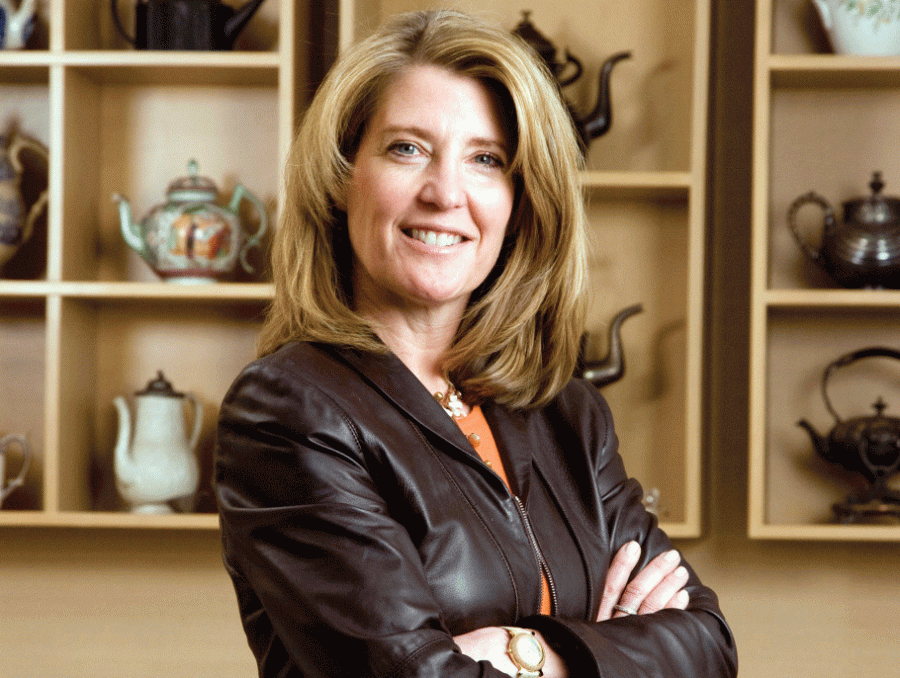CEO of Bigelow Tea Discusses Company’s Vision and Philosophy
On Tuesday, March 1, CEO of Bigelow Tea Company Cindi Bigelow gave a lecture to Colgate students about her experiences as an entrepreneur. This lecture was sponsored by Colgate Dining Services and the Thought Into Action Enterpreneurship Institute (TIA). Students may be familiar with Bigelow Tea as the company that has implemented the new Steep Café in Case-Geyer Library, which is the first of its kind. Bigelow explained that by teaching students more about the company she wishes to convey the importance of consumers to demand accountability from their suppliers.
“If you’re going to take the time to buy something and consume something, I think you should understand who that company is, and I think that that company needs to earn your respect,” Ms. Bigelow said.
Cindi Bigelow has been CEO of Bigelow Tea since 2005. Her grandmother, Ruth Campbell Bigelow, founded the company in 1945 after losing all of her assets in the Great Depression. Ruth Bigelow felt that there was very little quality tea in the United States at that time and found an old colonial recipe that she used to brew tea in her new enterprise.
Ms. Bigelow reflected on the history of the company and the struggles that come with beginning a small family business. Today, Bigelow Tea is the No. 1 specialty tea company in the United States and remains entirely family-owned.
Bigelow also discussed the high standards for quality and responsible sourcing that Bigelow Tea maintains, as well as its environmental impact.
“I’ve been to some wonderful, wonderful places sourcing the tea and I think that’s important especially for younger audiences and tea drinkers. Previous and older generations weren’t as concerned about the sourcing. They certainly wanted a good product and they wanted it for a good price, but they didn’t think as much about sourcing. I think the younger consumer really wants to know, ‘Where is that product coming from?’” she said.
Bigelow has traveled all over the world visiting tea gardens to approve quality of tea and the fair and equitable treatment of employees at these sources. Most of the teas that Bigelow Tea Company sells are Fair Trade certified, though the company doesn’t advertise that because it requires additional fees. Bigelow was particularly impacted by her trip to Sri Lanka, which provides great variations and selections of tea. These gardens are located at the tops of the mountains, and the country is known for paying the highest wages to tea leaf pickers.
Bigelow Tea is also devoted to supporting sustainable practices, both in their sources and in their own company headquarters. The “Steep” line, sold at Colgate, is 100 percent organic. The company also supports an active compost program, seeks to minimize waste, runs a community garden and utilizes solar panels. Another company hallmark is its commitment to charity. The business has raised over $1.2 million through the Bigelow Tea Community Challenge that takes place annually.
Overall, students enjoyed Ms. Bigelow’s explanation of the company and its practices.
“It was awesome how Colgate is the first place they are trying out their Steep Tea [brand]. It was really interesting to hear how they make tea and where it comes from because I believe in fair trade,” sophomore Taylor Washing said.
Students also appreciated the strong ethics of the company.
“I think that Cindi Bigelow is a confident CEO and President who really does a wonderful job emphasizing the family focus of Bigelow Tea. She truly seems to care for every single one of her employees, as she refers to them all as family. Bigelow Tea definitely stands out compared to the other main tea companies in the United States, and her talk inspired me to support Bigelow Tea even more,” sophomore Matt Leo said.
Ms. Bigelow offered valuable advice to Colgate students interested in running a business.
“In terms of entrepreneurship, I think you have to make sure you have a product or a service that is in some way unique to the area, unique to the consumer, something that you believe in. And if you believe in it and know that you’ve got something that’s special in its own way – it could be a service or a product – then you absolutely just have to go up mountains,” she said.
On the topic of being a female CEO, when only approximately 23 percent of CEOs of large companies internationally are female, Ms. Bigelow recommended trying to take gender out of the equation.
“I highly recommend that you don’t think of yourself as a female. I think that pigeon holes you. Yeah, I’m a female, clearly, but when I’m speaking I don’t think of myself as a female. I think of myself as a passionate leader who believes in their mission, and so that’s what I would recommend for young women … If you treat yourself the way you need to be treated, [other people] will treat you the way you need to be treated,” she said.




